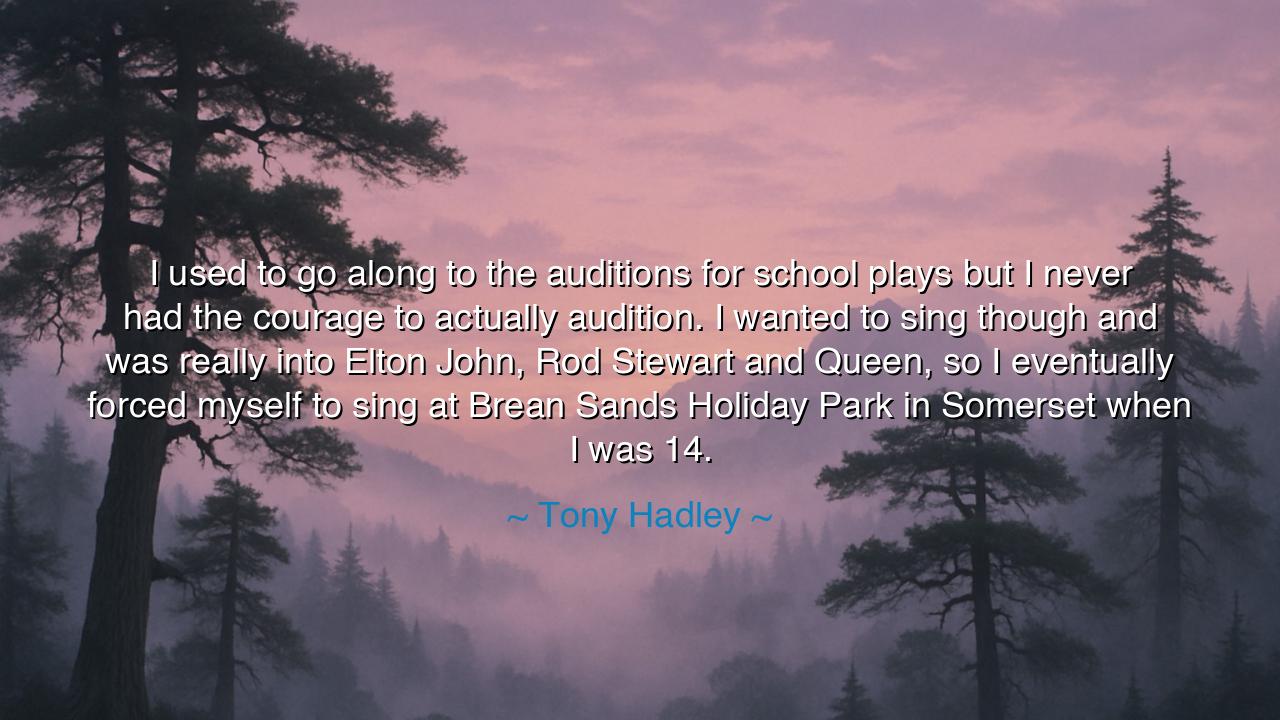
I used to go along to the auditions for school plays but I never
I used to go along to the auditions for school plays but I never had the courage to actually audition. I wanted to sing though and was really into Elton John, Rod Stewart and Queen, so I eventually forced myself to sing at Brean Sands Holiday Park in Somerset when I was 14.






The singer Tony Hadley, whose voice would one day soar through concert halls and define a generation of music, once spoke with disarming honesty about his beginnings: “I used to go along to the auditions for school plays but I never had the courage to actually audition. I wanted to sing though and was really into Elton John, Rod Stewart and Queen, so I eventually forced myself to sing at Brean Sands Holiday Park in Somerset when I was 14.” These words, though simple, carry the quiet thunder of a universal truth—that greatness often begins not with confidence, but with fear, and that courage is not the absence of fear, but the decision to act in spite of it. In Hadley’s confession, we see not merely the story of a singer’s first performance, but the eternal struggle of every soul that dreams—to find the strength to step forward when the heart trembles.
The origin of this quote lies in the early life of Tony Hadley, long before the fame, the lights, and the applause. As a boy, he loved music, adored the voices of legends like Elton John and Freddie Mercury, and felt in his heart the calling of melody. Yet, like so many before him, he was held back by that quiet enemy—fear—the fear of failure, of ridicule, of being seen and found wanting. How often do we, too, stand before the stage of our own dreams, wishing to act but frozen by doubt? Hadley’s memory is a mirror to all humanity: we long to express the beauty within us, but hesitate at the edge, afraid of falling.
And yet, in his story, there comes a turning point—the moment of courage. At the age of fourteen, in a modest seaside park in Somerset, he did not yet sing as a star, but as a boy breaking through the walls of his own hesitation. He forced himself, as he said, to take that step, to walk out from the shadows of fear into the light of possibility. It was not fame that awaited him then, but freedom—the liberation that comes when a person chooses to act, even when trembling. From that first performance, though small in scale, began a life shaped by music, by perseverance, and by the enduring lesson that no dream can live until it is dared.
The ancients understood this principle deeply. They taught that every hero’s journey begins not in triumph, but in uncertainty. Odysseus, before setting sail, feared the unknown seas; Leonidas, before Thermopylae, knew the odds were impossible; yet both chose to act, and through their action, found immortality. Likewise, the artist, the thinker, the lover—all must face their private battles before stepping into their destiny. Courage, in every age, has been the bridge between potential and realization, between the silent heart and the song that must be sung. Hadley’s story, though humble, stands in this same lineage: it is not the tale of a boy who could sing, but of a boy who dared to.
Consider also how fear disguises itself as prudence or humility. Many souls, like Hadley in his youth, attend the auditions of life—they show up, they dream, they watch—but never take the step to audition. They tell themselves, “Not yet,” or “I am not ready,” and in doing so, lose the chance to discover who they might have become. Yet the world rewards not the observer, but the participant—the one who dares to step onto the stage, even when uncertain of the outcome. Hadley’s decision to sing that night was not a small act—it was a declaration of identity, the first heartbeat of his artistic life.
In his words lies a lesson that stretches far beyond the realm of music. Whatever your dream may be—to create, to lead, to love, to build—you will one day find yourself standing at the threshold of fear. The question will come: will you stay in the comfort of the audience, or will you walk into the light of the stage? Courage is not granted by fate—it is forged by choice. To “force oneself,” as Hadley did, is not weakness, but strength. It is the act of taking command of your destiny when fear seeks to command you.
So, my child, take this wisdom to heart: when you feel the weight of hesitation pressing down upon your spirit, remember Tony Hadley’s words. Remember the boy who stood at the edge of a small stage, shaking, yet stepped forward anyway. Let that image remind you that the beginning of greatness often looks like an act of trembling. Do not wait for the moment when you feel ready; readiness comes only after the leap. Whether your stage is great or small, whether the world watches or not, let your courage lead your voice.
For every destiny begins with a single act of bravery, every masterpiece with the first note, every triumph with the choice to begin. Courage, once awakened, becomes its own melody—rising, expanding, and carrying the soul toward greatness. Thus, from a boy’s trembling song in Somerset was born a voice that would one day move millions. And so it shall be with you: when you act in courage, you light a flame within yourself that no fear can ever extinguish.






AAdministratorAdministrator
Welcome, honored guests. Please leave a comment, we will respond soon